|
|
|
Sort Order |
|
|
|
Items / Page
|
|
|
|
|
|
|
| Srl | Item |
| 1 |
ID:
155159
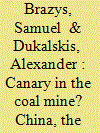

|
|
|
|
|
| Summary/Abstract |
How China assumes its position of superpower is one of the most important questions regarding global order in the twenty-first century. While considerable and sustained attention has been paid to China’s growing economic and military might, work examining how China is attempting, if at all, to influence the ecosystem of global norms is in its earlier stages. In this article we examine China’s actions in an important venue for the development of global norms, the United Nations General Assembly (UNGA). Using a unique dataset that captures how other countries move into or out of alignment with China on UNGA resolutions that are repeated over time, we find statistical evidence that China used diplomatic and economic means in an attempt to subtly alter international norms. We further illustrate these findings by examining four states that made substantive moves toward China on resolutions concerning national sovereignty, democracy, international order, non-interference, and human rights.
|
|
|
|
|
|
|
|
|
|
|
|
|
|
|
|
| 2 |
ID:
155153
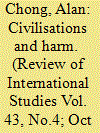

|
|
|
|
|
| Summary/Abstract |
Andrew Linklater’s Violence and Civilization in the Western States-System is to be both praised and critiqued for opening spaces for discussing civilisational standards in the era of a globalising world. It offers a healthy provocation for inquiry into how non-Western states ought to comprehend the legacies of Western political evolution colouring existing ‘IR’ as a discipline. Linklater’s book inspires three thematic reactions: globalisation does bring harm; the notion of a universal civilisation remains open to debate; and the possibilities of civilising patterns in premodern Southeast Asia serving as supplementary mirrors and extensions of the relationship between violence and civilisation. It is suggested that Linklater’s sequel must consider the trajectory of non-Western sociologies of IR.
|
|
|
|
|
|
|
|
|
|
|
|
|
|
|
|
| 3 |
ID:
155156
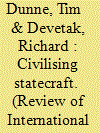

|
|
|
|
|
| Summary/Abstract |
In this contribution to the forum marking the publication of Andrew Linklater’s remarkable book on Violence and Civilization in the Western States-Systems we first locate the book in the context of Linklater’s overarching intellectual journey. While best known for his contribution to a critical international theory, it is through his engagement with Martin Wight’s comparative sociology of states-systems that Linklater found resonances with the work of process sociologist, Norbert Elias. Integrating Wight’s insights into the states-system with Elias’s insights into civilising processes, Violence and Civilization presents a high-level theoretical synthesis with the aim of historically tracing restraints on violence. The article identifies a tension between the cosmopolitan philosophical history which underpins the argument of the book, and which has underpinned all Linklater’s previous works, and the ‘Utrecht Enlightenment’ that offers a conception of ‘civilized statecraft’ at odds with a universal conception of morality and justice. The article then examines Linklater’s argument about the ‘global civilizing process’ as it applies to post-Second World War efforts to build greater institutional capability to protect peoples from harm. It is argued that Linklater over-estimates the extent to which solidarism has civilised international society, and that the extension of state responsibilities and development of civilised statecraft owe more to pluralism than solidarism.
|
|
|
|
|
|
|
|
|
|
|
|
|
|
|
|
| 4 |
ID:
155151


|
|
|
|
|
| Summary/Abstract |
This article reviews Andrew Linklater’s Violence and Civilization in the Western States-Systems. Focusing upon the book’s explanation of the ‘European civilizing process’ in the modern era, it suggests that the account is limited by ‘civilizational isolationism’ and ‘metrocentric diffusion’. These analytic operations serve to minimise the agency and contributions of non-Western, colonial, and postcolonial actors to the global civilizing process. The occlusion of such agency and contributions, however, are not specific to this work, but reflect broader limitations in historical sociology writ large.
|
|
|
|
|
|
|
|
|
|
|
|
|
|
|
|
| 5 |
ID:
155149
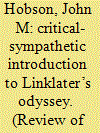

|
|
|
|
|
| Summary/Abstract |
This article provides an ‘engaged’ introduction to this forum on Andrew Linklater’s recently published book, Violence and Civilization in the Western States-Systems. I call this ‘engaged’ because I seek to adjudicate between the critics and Linklater’s book in the hope of building a bridge over troubled water. Given that the key word that underpins many of this forum’s contributions is Eurocentrism, I explore whether, and if so to what extent, Linklater’s book is Eurocentric. While I too identify various Eurocentric cues, I also provide various defences for Linklater. In particular, the final section advances two definitions of Eurocentrism and anti-Eurocentrism. Although I identify elements of ‘Eurocentrism I’ (the elision of non-Western agency and reification of the West) in his book, Linklater might respond to the principal forum complaint that he accords little or no role to non-Western actors and processes in the Western or global civilizing process by appealing to an alternative anti-Eurocentric approach: ‘anti-Eurocentrism II’ (which focuses squarely on Western imperial power and ignores or heavily downplays non-Western agency). I close by critiquing his left-liberal cosmopolitan politics, arguing that his Eurocentric-universalist normative posture cannot create the kind of peaceful and harmonious world that he (and Kant) so desires.
|
|
|
|
|
|
|
|
|
|
|
|
|
|
|
|
| 6 |
ID:
155152
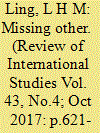

|
|
|
|
|
| Summary/Abstract |
As Andrew Linklater has shown, Europeans have decreased their tolerance for, or endorsement of, violence over the centuries. Various international and domestic conventions demonstrate the point. This accomplishment rightfully deserves celebration. But herein lies the rub. While Linklater recognises the role of imperialism and colonialism in perpetrating global violence, he does not grant equal opportunity to the Rest in contributing to the world’s new moral heights. Linklater assumes, for instance, that Las Casas never talked with indigenes to realise that they, too, warrant recognition as human beings; Catholic piety alone sufficed. The West thus towers in singular triumph, embedding International Relations (IR) in what I call Hypermasculine Eurocentric Whiteness (HEW). Still, the Other retains a sense of its Self. An effervescent spirit of play enables resilience and creativity to co-produce our world-of-worlds. Come out and play!, I urge. It’s time to shed IR’s ‘tragedy’ for the sparkle within.
|
|
|
|
|
|
|
|
|
|
|
|
|
|
|
|
| 7 |
ID:
155154
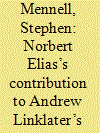

|
|
|
|
|
| Summary/Abstract |
Andrew Linklater’s projected trilogy of books for Cambridge University Press rests distinctively on the work of the sociologist Norbert Elias (1897–1990). Linklater is creating a powerful theoretical orientation for the field of International Relations by synthesising the ideas of Martin Wight and the ‘English School’ of IR with those of Elias. Though Elias is best known for his theory of civilising processes – on which Linklater draws most prominently – his writings are far more extensive. In particular, his sociological theory of knowledge and the sciences underlies Linklater’s recent writings, even if that is not immediately apparent on a cursory reading. This article spells out some of the ‘Eliasian infrastructure’ that may not be familiar to many of Linklater’s readers. It also discusses ways in which common misunderstandings of Elias’s ideas may lead to parallel misunderstandings of Linklater’s. The article concludes by asking whether, even if Linklater’s vision of the growth of ‘cosmopolitan responsibility’ may prove correct in the long term, we may nevertheless be experiencing something of a (possibly short-term) reversal towards ‘cosmopolitan irresponsibility’.
|
|
|
|
|
|
|
|
|
|
|
|
|
|
|
|
| 8 |
ID:
155160
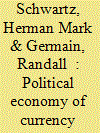

|
|
|
|
|
| Summary/Abstract |
The rise of China has sparked a debate about the economic and political consequences for the global economy of the internationalisation of the renminbi. We argue that the dominant focus of this literature – primarily the external conditions and requirements for a national currency to become an international currency – misspecifies the connections between the international and domestic requirements for currency internationalisation, as well as the potential to become the dominant international reserve currency. We correct this oversight by developing an integrated theoretical framework that highlights the domestic adjustment costs which a state must accommodate before its currency can carry the weight of internationalisation. These costs constitute a critical element of an international currency’s ‘political economy’, and they force states to negotiate contentious social trade-offs among competing domestic claims on finite public resources in a sustainable manner. Our analysis suggests that the likelihood of China being able to successfully negotiate the social costs associated with running a fully internationalised currency is currently very low, precisely because this will place unacceptable pressure on groups benefiting from the economic and political status quo. This further suggests that the American dollar will remain unchallenged as the global economy’s pre-eminent international currency for the foreseeable future.
|
|
|
|
|
|
|
|
|
|
|
|
|
|
|
|
| 9 |
ID:
155158
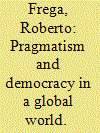

|
|
|
|
|
| Summary/Abstract |
This article discusses the advantages of a pragmatist theory of global democracy for understanding the political relevance of new phenomena such as the emergence of forms of private authority and transnational movements in tackling with global issues. The article shows in particular that the pragmatist notion of ‘publics’ offers promising insights and proves particularly promising for completing the transition from methodological nationalism to methodological cosmopolitanism that is required to understand new normative practices developing at the global level and to inquire into their conditions of validity. After having presented a basic outline of the pragmatist theory of democracy, I discuss the contribution of pragmatism to the critique of methodological nationalism and proceed then to examine and reject two alternative approaches to global politics – transnational public sphere theory and global representation theory – showing why they fail to overcome methodological nationalism. The last two sections explore private entrepreneurial authority in contexts of global governance and shows that pragmatism succeeds in explaining their political role, while the other two approaches fail.
|
|
|
|
|
|
|
|
|
|
|
|
|
|
|
|
| 10 |
ID:
155157
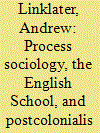

|
|
|
|
|
| Summary/Abstract |
This article responds to critics of Violence and Civilization in the Western States-Systems (Cambridge University Press, 2016). It provides a rejoinder to challenges to the attempted synthesis of process sociology and the English School analysis of international society. It rebuts the postcolonial contention that the process-sociological analysis of the impact of the European ‘civilizing process’ on the modern states-system is Eurocentric. The article explains how process sociology contributes to the postcolonial critique of ‘civilization’. It concludes by arguing that their combined strengths of the two perspectives can inform the comparative study of Western and non-Western ‘civilizing processes’ and support the development of a more ‘global IR’.
|
|
|
|
|
|
|
|
|
|
|
|
|
|
|
|
| 11 |
ID:
155155
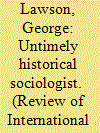

|
|
|
|
|
| Summary/Abstract |
This article examines the historical sociology that informs Andrew Linklater’s Violence and Civilization in the Western States-Systems. On the sociological side, it critically assesses Linklater’s use of Elias and Wight, arguing that his ‘higher level synthesis’ is internally incompatible. On the historical side, the article argues that the occlusion of the transnational interactions that, in great measure, drive historical development means that Linklater’s analysis is inadequate for its stated purpose: to chart the development of civilising processes within the Western state-systems.
|
|
|
|
|
|
|
|
|
|
|
|
|
|
|
|
| 12 |
ID:
155150


|
|
|
|
|
| Summary/Abstract |
The article discusses the manner in which the story of the international system and the relationship between violence and civilisation that Andrew Linklater tells in Violence and Civilization in the Western States-Systems remains on the visible side of the absyssal line. Absyssal thinking refers to the distinctions created between visible and invisible realms and it is Eurocentrism as a system of knowledge that sustains and reproduces this abyssal line. The article will focus on two instances of reproducing this abyssal line. The first will be with respect to the way in which histories of Europe and colonialism are detached from each other. The second will be on where political and moral ‘progress’ is being located within the development of the ‘global civilizing process’.
|
|
|
|
|
|
|
|
|
|
|
|
|
|
|
|
|
|
|
|
|